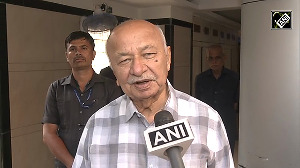There were little signs of rapprochement between the US-EU combine and the new alliance of developing countries, which has a new member in Turkey.
While the G-22, formerly the G-21, sought the support of countries belonging to the African Union and the group of least developed countries, the US tried to create a rift in the formation.
On the contentious issue of agricultural trade, the US promised to "wash away its sin" by substantially cutting farm subsidy if the G-22 agreed to steep tariff cuts.
| |||||||||||
During consultations facilitated by Singapore Trade Minister George Yeo Yong-Bon, on the second day of the World Trade Organisation's Cancun ministerial meeting, US Trade Representative Robert Zoellick conceded that developed countries had "committed a sin" by offering millions of dollars in support to their farmers.
Zoellick, however, bluntly asked the G-22 members if they were ready to offer any concessions in exchange for a cut in domestic support and export subsidies on farm produce.
EU Commissioner for agriculture Frank Fischler, who also attended the consultations, argued the case for the continuation of export subsidies.
Fischler, though willing to negotiate market access, was not ready to budge on the issue of cutting domestic support.
Meanwhile, the G-22 members started parleys with the African Union and the least developed countries group to garner support for their demands seeking reduction of export subsidies, domestic support and import tariffs by developing countries.
The G-22 is also seeking safeguard mechanisms to protect their interests. On its part, the US is trying to engineer a split in the ranks of the developing countries.
In Washington, Chairman of the Senate Committee on Finance Chuck Grassley, in a veiled threat, questioned the commitment of countries like Columbia, Thailand, Egypt and South Africa. These countries, which are part of the G-22 alliance, are also negotiating free trade agreements with the US.
" (they) are seeking to deepen their relationship with the US but are resisting opening their own markets for agricultural trade. This makes me question their commitment to free trade and their interests in pursuing the strong market access commitments required to conclude free trade agreements with the US," Grassley said in a statement.
However, coordinators of the G-22 were confident that India, China, Brazil, Argentina and South Africa would stay together in their opposition to the farm proposals submitted by the EU and US.
Away from Cancun, heads of states are making efforts to ensure that the G-22 coalition stays intact.
South African President Thabo Mbeki had written to Prime Minister Atal Bihari Vajpayee and Chinese Premier Hu Jintao to seek their support, top government officials said.
Zambian Commerce Minister Dipak KA Patel told Business Standard the African Union had asked the G-22 to factor in the concerns of single commodity countries on market access and special and differential treatment.
"You could expect a decision in the next two days or so," Patel said. He said the alliance would help smaller countries push their case at the 146-member multilateral body.
Yeo, the facilitator for agricultural negotiations, said there was some indication of flexibility among countries, but delegations were still keeping their cards close to their chest.
The Singapore trade minister will wait till Saturday evening for countries to bury their differences, failing which he will release a hybrid text.





 © 2025
© 2025